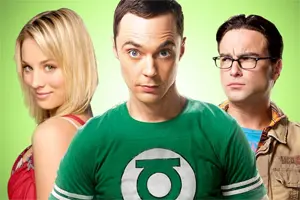How The Big Bang Theory became a megahit: "It’s smart about being dumb about being smart"
-

How did a show about geeks become so big that it plays everywhere, including hospital waiting rooms? Hank Stuever tried to find out and, after spending a day watching Big Bang reruns, writes: "I can only sit in slack-jawed respect for everything that made the show work." Stuever adds: "To start, there’s the precision of its concept matched with the rigid (some would say confining) simplicity of its format. It’s smart about being dumb about being smart. There’s the attention to detail that turned potentially niche characters — four male physics nerds with geeky pop-culture proclivities who all worked at the California Institute of Technology in Pasadena — into appealingly broad subversions of old, sad stereotypes. There’s the irritatingly catchy theme song, supplied by the dorky Canadian rock band Barenaked Ladies, that boils the origin of all cosmic and earthly existence down to 20 seconds, emblematic of the show’s celebration of science and math, at a time when facts are dangerously dismissed as opinions. And there was the implicit but never acknowledged understanding that at least one of its characters — Sheldon — could be viewed as coping with a developmental disorder; Asperger’s, one might suggest, if one was reviewing another kind of show where characters are openly diagnosed and described. Over the years, Sheldon’s social awkwardness and off-putting superiority was woven into his friendships and eventual marriage as a matter of mirth, rather than being singled out for maudlin tonal shifts away from comedy. Sheldon caught on with America because we didn’t necessarily need him explained to us."
ALSO:
- The Big Bang Theory deserves credit for transcending "nerd culture" after feeding off its exploding popularity: "It’s no Black-ish or Fresh Off The Boat, but when considering a show like Modern Family and its rapid descent into complacency, there’s something to be said for The Big Bang Theory managing to not only harness the mainstreaming of nerd culture to become a dominant force in the ratings, but to also find ways to transcend that by rooting its more important character arcs in actual emotional growth," says Kyle Fowle. "Whether it was Sheldon gradually learning to be a more open, empathetic person or Leonard learning how to be a good partner in a relationship where he’s constantly insecure, the show, in its later years, evolved. Originally, the show was happy to point and laugh at grown men who like superheroes and Star Wars and Dungeons & Dragons—an easy target that also occasionally deserves the criticism—but The Big Bang Theory eventually had to shift gears because of the changing pop culture landscape, giving its women bigger roles and moving toward something more like a family sitcom, with weddings, pregnancies, and relationships that ebbed and flow."
- The foundational concept of Big Bang Theory explains why it's both adored and despised: "The show has been accused of stereotyping 'geeks' and 'nerds' (two terms that had become especially trendy when the show premiered in 2007), thus alienating the very community it is based on," says Clémence Michallon. "But others have also praised what they saw as a message of inclusion and tolerance – a position defended by the show’s co-creators, too."
- The Big Bang Theory is far from its peak, but the finely drawn characters can say nothing and still get a laugh from fans
- Revisiting The Big Bang Theory pilot -- and its continuity errors
- Why Jim Parsons walked away from Big Bang: "It was the first time in my life of doing this show that it occurred to me that I might want to not do another contract after (Season) 12 was up. I don't know if it's because I'm an Aries or just because maybe I'm in touch with myself. Whatever it is, once I had that thought, I was like, 'Well, that's your answer.'"
- Mayim Bialik says the final season is like "a long, drawn-out death": “It’s one thing to have a personal experience where a job of nine years — or 12, for some of the cast — ends, but we’ve done it very publicly"
- The Big Bang Theory cast recall their auditions
- Big Bang showrunner Steve Molero jokes that the series finale will have more deaths than Game of Thrones
TOPICS: The Big Bang Theory, CBS, Bill Prady, Chuck Lorre, Jim Parsons, Johnny Galecki, Kaley Cuoco, Mayim Bialik, Steven Molaro
More Big Bang Theory on Primetimer:- A Big Bang Theory spinoff is on the way as Stuart Fails to Save the Universe set to drop on HBO Max
- These two sitcoms never streamed in full until HBO Max paid $1.5B for them
- The Big Bang Theory fixed a major problem that plagued Two and a Half Men for years
- The Big Bang Theory hits differently once you’ve seen Sheldon’s childhood in Young Sheldon
